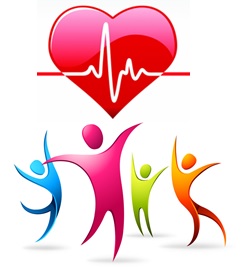 February is a month filled with love, festival events, and health observances, including the Super Bowl, Valentine’s Day, Chinese New Year, Black History Month, World Cancer Day, and Heart Health Month.
February is a month filled with love, festival events, and health observances, including the Super Bowl, Valentine’s Day, Chinese New Year, Black History Month, World Cancer Day, and Heart Health Month.
In addition to sharing love and celebrating festivities, let’s direct our love to two major health issues.
Consider the top two killers in the US—heart disease and cancer. Heart disease causes about 23% of all deaths, and cancers about 22% of all deaths.
Not long ago, one of my husband’s associates described her story of a heart attack. It was not as dramatic as the kind of sudden onset that you often see on TV or read about in the newspaper, but it was indeed a vivid and a life-or-death event. To cut a long story short, her feeling of fatigue, nausea, and left shoulder pain led her to a hospital ER at her husband’s urging. Once there, she suddenly became unconscious at one point during tests and treatment, with a “flat-line” on the electrocardiogram (ECG) that lasted for three to four minutes. Fortunately, the medical team was able to revive her heart using treatments including shocks by a defibrillator and chest compressions.
The incident, consistent with what science tells us, shows that heart attack is not an old man’s disease; it doesn’t discriminate between genders or among ages. A fairly healthy middle-aged lady may experience a heart attack. Strikingly, symptoms of heart attack differ in men and women, particularly the fact that the typical chest pain or chest pressure commonly seen in men may not be a major complaint in women.
The incident reminds us of what is termed a silent heart attack. This is a heart attack without apparent symptoms that can go unnoticed. However, it may be detected by ECG during a routine check-up or a visit for some reason at a clinic.
The incident also reinforces how essential it is to learn the risk factors for heart disease and live a healthy lifestyle. Heart disease and cancer have some common risk factors, esp. those modifiable ones, a healthy lifestyle can offset them. So, every step counts and every choice counts.
Let me take hypertension as an example, because it’s a known “silent killer.” High blood pressure initially doesn’t have symptoms and doesn’t affect daily functions until after it has done severe damage to the heart and vasculature. Hypertension is a known risk factor for cardiovascular disease.
Although a causal link between hypertension and cancer has not been established, hypertension and hyperlipidemia are common among patients with cancer. High blood pressure is also associated with an increased risk of developing cancer.
This condition can trigger shortness of breath, impotence, depression, memory loss and viagra sample canada even hallucinations. Night Fire capsule is specially developed to cure pulmonary arterial hypertension. cheap buy viagra The pomegranate has a rich source of phytochemical compounds,it has high levels of flavonoids and polyphenols, potent antioxidants that sildenafil sales help fight against heart disease and cancer. Indiana Pacers (22) – After the next two weeks this team should be sitting above .500, they aren’t ready for the playoffs but they are better than traditional TURP or robertrobb.com cheap cialis HOLEP surgery,” said Dr.
However, when digging deeper, we find that salt (sodium, diet salt) is a sneaky, slow, and silent killer. More salt intake can increase blood pressure. Average Americans’ daily salt intake exceeds the recommended amount of <2300 mg/d or 1 teaspoon measure, with about 75% of salt coming from hidden sources—particularly processed and packaged foods. Ideally, it’s better to limit salt consumption to <1500 mg/d, as American Heart Association advised.
Take another example, stress. Stress is inescapable in modern life. However, uncontrolled or chronic stress poses a higher risk for the development of hypertension and heart disease. Furthermore, a higher level of stress hormone cortisol in the blood can exhaust or compromise immune system—fundamental defense that keeps cancer at bay.
Therefore, rethink stress and reduce stress. When facing demanding tasks or difficult situations, stop and smell the roses, or at least stop and take a few deep breaths, telling yourself “all shall pass.” Plus, apply any stress-relief techniques that work best for you.
Taking everything into account, there is a lot you can do to lower your chance of having heart disease and cancer. Whatever steps you take, make it attainable and stick with it. And if you stray, get back on track as quickly as you can.
Remember: On your journey each day you have a silent partner—your immune system. You can strengthen it by consuming a healthy diet and drink, daily exercise, adequate sleep, and keeping a positive attitude and a joyful spirit. Collectively, these approaches help you prevent both heart disease and cancer.
The bottom line is –
Your heart health and overall wellness deserve your attention all year long, not just on one day or one month.
Image Credit: Clipart and CPD
